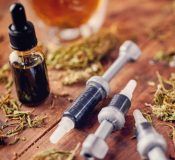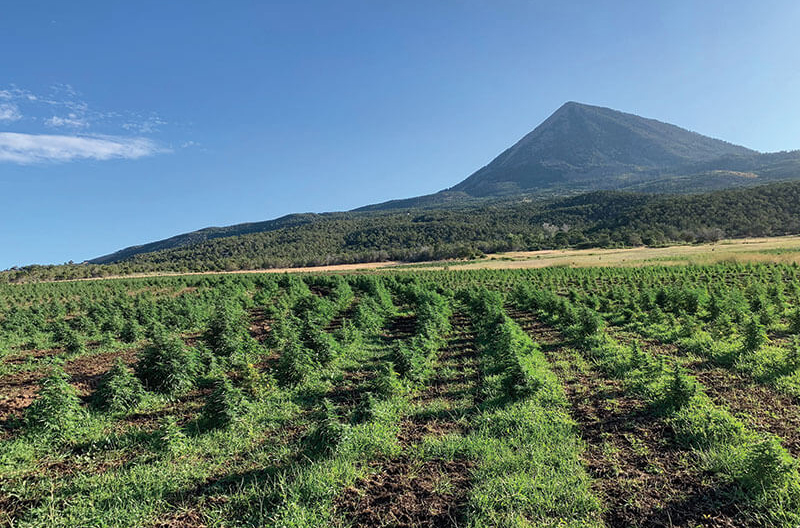sponsored content
Cannabidiol products have been rising in popularity due to numerous perceived health benefits for both humans and pets, according to Golden, Colorado-based Panacea Life Sciences. Since the hemp industry became federally legal with the signing of the 2018 Farm Bill, non-traditional companies have been tasked with expansion of manufacturing to meet customer demand. Creating quality CBD products involves several complex steps that must be performed correctly and have sufficient testing to provide reliable products for consumers. 
Growing and processing the hemp plant presents unique concerns that require proper growing conditions to ensure the resulting plant extracts are free from contaminants. Furthermore, careful attention to extraction procedures that may introduce additional contaminants into the oil, and therefore must be removed, makes the manufacturing process difficult and meticulous. Taking these issues together has resulted in an industry-wide lack of quality control, leading to over 50 percent of today’s commercialized products to fail potency and purity quality requirements that are standard for other product categories.
Quality issues are the main reasons why retailers must perform due diligence in choosing a manufacturer and CBD product line. One strategy hemp manufacturers are utilizing to increase quality of products is to become vertically integrated, meaning the company controls the entire process from growing the hemp, extraction, production of CBD-oil and manufacturing finished products, recently coined as the phrase “seed to sale.”
Quality products always start with quality hemp
By owning the hemp farm, CBD manufacturers are not only able to produce CBD oils with elevated minor cannabinoids and terpenes but can also ensure the plants are free from contaminants.
Where and how the hemp plant is grown is especially important as hemp is a hyper-accumulator of contaminants in the soil. Any heavy metals or organic contaminants in the soil will be absorbed by the roots of the hemp plant and stored in the leaves and flowers used to make CBD oil. Because hemp has the complex characteristics of a deep tap root that can penetrate the soil up to 8 feet, a rapid growth cycle of 12 weeks and very efficiently absorbs pollutants in the soil, hemp is often used for phytoremediation, or restoring, of contaminated fields.
In fact, farmers in Italy have successfully cleansed dioxin contaminated fields, and the University of Virginia has performed studies on how hemp can be used to clean up contamination from coal processing. The hemp plant has even been used to help remediate radioactive contamination from the 1986 Chernobyl nuclear reactor disaster. For these reasons, among others, vertically integrated hemp companies will ensure their hemp crops are organically compliant to minimize crop contamination, and most companies will work toward organic certification of their growing operation which first became available to the hemp industry late last year (2019).
Because there are approximately 20 different strains of hemp that will be grown for the 2020 season, the hemp strains will vary in CBD levels, minor cannabinoid content, terpenes and flavonoids. Terpenes and flavonoids are the compounds in the plant that give cannabis its unique smell and taste, respectively. The combination of cannabinoids, terpenes and flavonoids may enhance the health benefits of hemp oil as these compounds work in unison to produce what is commonly called the “entourage effect.” Strains such as Otto-2 have a lower terpene content and will smell like fresh cut grass, whereas strains like Abacus have a strong marijuana odor, although there is very little tetrahydrocannabinol (THC) in either plant.
As customers become more knowledgeable about various benefits of the hemp plant, it will be important for manufacturers to be able to speak to the strains utilized to generate cannabidiol and other cannabinoids. Vertical integration allows for full traceability from the hemp plant to the finished product.
Extraction of oil from the plant
After growing high-quality hemp, the oil must be extracted from the leaves and flowers of the plant. In this process, approximately 20 Kg of plant material will be concentrated into 1 Kg of hemp oil, so any contaminants in the plant also will be concentrated by 10-20-fold in the hemp oil. Talented extractors are able to efficiently create hemp oil and ensure any introduced solvents are removed.
Creating hemp oil is accomplished by incubating plant material in a hydrophobic (water-hating) solvent, then removing the solvent to leave the hemp oil. The two most widely used solvents to create hemp oil are ethanol and supercritical carbon dioxide (CO2). Cold ethanol extraction must be performed with food-grade 200 proof ethanol. Following extraction, the ethanol is removed through heat. The resulting oil, as shown in figure 1, is typically called “crude oil” and is approximately 65 percent CBD by weight. This crude oil retains terpenes, so it is an aromatic viscous oil.

Supercritical CO2 uses cool temperature and pressure to convert CO2 into liquid that is then mixed with the plant material. The hemp oil-liquid CO2 is then pumped into a new chamber where the CO2 is allowed to evaporate which leaves behind the hemp oil, similar to how dry ice goes from solid to gas, leaving no residue. The oil that is produced by CO2 extraction typically has the terpenes removed initially but can be added back at any time, and the result looks much like caramel.

Crude oil can be used for manufacturing products, or it can be further refined through distillation. CBD distillate, as shown in figure 2 above, has the appearance and viscosity of honey.
CBD distillate can then have the THC removed using chromatography, or the CBD can be precipitated to create CBD isolate. Both procedures will introduce organic solvents to the CBD preparation which must be completely removed prior to manufacturing. This is why it is essential that, as part of the batch testing record, residual solvents are measured.
Non-traditional companies manufacturing CBD products, progressing to GMP
Because of the confusion in the legal status of industrial hemp prior to 2018, banking issues and a lack of regulations for manufacturing CBD products, traditional dietary supplement manufacturing companies have delayed working in the hemp space. This has led to current CBD manufacturing companies making their own products. Unfortunately, many hemp companies lack institutional knowledge regarding the Good Manufacturing Process (GMP) nor do they implement sufficient quality testing procedures to ensure products meet potency and purity standards.
While the Food and Drug Administration is working to determine rules for manufacturing hemp products, states such as Colorado that currently require hemp extraction and manufacturing meet food safety standards are poised to implement GMP requirements for extraction, laboratory testing and product manufacturing. Regardless of the location of the CBD company, retailers should ensure each product be tested for CBD and THC levels as well as for contaminants (heavy metals, pesticides, residual solvents and to ensure the product is free from microbial contamination). Production batch records should be readily available with ease of access for both the retailer and end consumer.
Helpful criteria for choosing hemp manufacturers
Manufacturing quality hemp products is a complex process that requires stringent quality control. As retailers evaluate various products and manufacturers, it is important to ensure proper quality control procedures are instituted and that manufacturers are producing product through a GMP process and are transparent in providing testing records.
Companies that are truly vertically integrated, meaning they own the entire process from seed to sale, allow for superior products to be manufactured. Vertically integrated companies should be able to easily show complete traceability and testing records for each step in the process of creating CBD products; in these ways, retailers can be assured that selected products will meet the potency and purity standards that their customers require.


Added to that the huge value potential in the high quality genome sequence of the hemp/cannibis lines assembled by XXII and KeyGene accessible to Panacea! This is proprietary and believed to be among highest quality hemp/cannibis reference genomes in the world. This will allow the company to target cannabinoids of the 100’s in the plant that will give the potentially novel medicinal cannabinoid profiles being sought. WOW, What a future awaits.